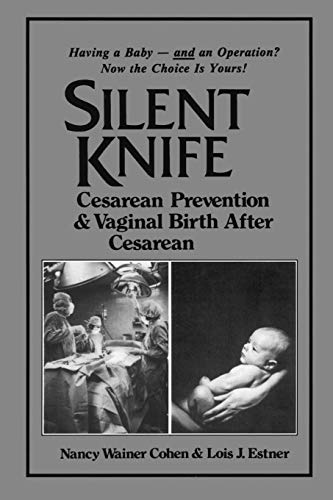Silent Knife
Cesarean Prevention and Vaginal Birth after Cesarean (VBAC)
Lois J. Estner; Nancy Wainer Cohen
BOOK REVIEW

In the realm of maternity care, few works resonate with the urgency and profundity as Silent Knife: Cesarean Prevention and Vaginal Birth after Cesarean (VBAC) by Lois J. Estner and Nancy Wainer Cohen. This groundbreaking text is not just a manual; it is a powerful manifesto advocating for women's autonomy and informed choices in childbirth. The authors stand at the revolutionary frontier of maternity practices, challenging conventional wisdom with eloquence and passion that electrifies.
This book emerges from the shadows of a medical landscape dominated by fear and surgical intervention, claiming loudly and unapologetically that a cesarean is not the only pathway to motherhood. With a stirring blend of personal narrative, evidence-based research, and an undeniable call to action, Estner and Cohen ignite a fervor in readers, compelling them to question the status quo. They dissect the psychological and physical ramifications of cesarean births, illuminating the often-overlooked emotional toll on mothers who feel stripped of choice and agency.
Yet, this isn't simply a critique of cesarean procedures; Silent Knife dives deep into the empowering potential of VBACs (Vaginal Birth After Cesarean). The authors present compelling stories of women who defied the odds, reclaiming their birthing narratives. Each case study presented fills the pages with hope, resilience, and an unyielding spirit, showcasing that the journey of childbirth can be one of profound strength rather than surgical scars.
Historians and obstetricians alike should take note of the broader context in which this work was written. In the early 1980s, a wave of feminism was challenging patriarchal norms, not just socially and politically, but within the realm of health care as well. Estner and Cohen's narrative was part of that revolutionary dialogue. They drew upon a growing body of work addressing women's rights, bodily autonomy, and the quest for physical and psychological well-being during childbirth.
Reader reactions to Silent Knife span the spectrum-some praise its forthrightness and dedication to empowering women, while others criticize it for being too idealistic or for not adequately addressing the complexities surrounding cesarean surgeries in certain medical contexts. Yet, one cannot deny the impact it has had on the discourse surrounding childbirth options. This book has sparked conversations that ripple through time and space, influencing healthcare policies and birthing practices globally.
As echoes of Estner and Cohen's insights continue to permeate discussions in obstetrics and gynecology, the relevance of Silent Knife remains unyielding. It serves as a reminder that the journey of motherhood, fraught with uncertainty and challenges, also holds profound potential for empowerment, reclamation, and transformation. Can you hear the whispered stories of every mother who fought for her voice, every child that found its way into the world through empowerment rather than necessity? This book opens the door to those conversations, compelling us to stand witness to the beauty and chaos of childbirth in all its forms.
Leaving the reader with the profound realization that birth can be a beautiful rebellion against a system that often prioritizes expediency over compassion, Estner and Cohen urge you to dare to dream. It isn't just a book; it's an emotional journey that will provoke, inspire, and compel you to challenge everything you thought you knew about childbirth. Are you ready to embrace the power of choice? 🌟
📖 Silent Knife: Cesarean Prevention and Vaginal Birth after Cesarean (VBAC)
✍ by Lois J. Estner; Nancy Wainer Cohen
🧾 464 pages
1983
#silent #knife #cesarean #prevention #vaginal #birth #after #cesarean #vbac #lois #estner #LoisJEstner #nancy #wainer #cohen #NancyWainerCohen